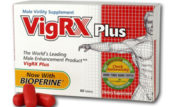Erectile dysfunction is a common, but not inevitable symptom of aging. Lifestyle, healthy habits and commitment to regular sex all contribute to man’s ability to produce wood, whether he’s 30 or 90.
But erectile dysfunction persists, in bedrooms and homes around the world. Seniors and men with erectile dysfunction pounced on Viagra upon its introduction in 1998. Cialis and Levitra entered the fray in 2003, as competition.
Recently, consumers and men with erectile dysfunction are turning to male enhancement pills. This may surprise observers, but it’s not unforeseen, nor undeserved. Natural male enhancement products use botanicals and nutrients used for centuries, to boost sex drive, increase semen production, and among other things, to treat erectile dysfunction.
Can male enhancement pills treat erectile dysfunction? And if so, are they as effective as prescription pills, like Viagra?
Prescription ED pills work. Of that there’s no confusion. They’re popular too. Some estimates claim that up to 20% of American men over 40 have tried Viagra to treat erectile dysfunction. Prescription pills aren’t without side effects, mind you, including headaches, nasal congestion, vision impairment, and in rare cases, heart attacks.
But a recent study notes some interesting findings about ED prescription pills, and more specifically, the men who use them – they’re three times more likely to contract a sexually transmitted disease.
The study, conducted by the Massachusetts General Hospital Department of Medicine, analyzed the insurance records of 1.4 million study participants from 1997 to 2003. The study didn’t include information about the participants’ sexual behaviours, but rather looked at their private insurance claims, and highlighted some surprising results.
STDs among older adults are rare, at about 1 in 1,000 adults. But men who used ED prescription pills contracted STDs, especially HIV and chlamydia, at three times the rate of men who didn’t use prescription pills.
About 40% of men ages 57-85 suffer from some form of erectile dysfunction, and as the researchers noted, people age 50 and older are one-sixth less likely to wear a condom, and one-fifth less likely to be tested for HIV compared to people in their 20s.
In addition, it’s worth mentioning that prescription pills are, by definition, drugs. ED prescription pills don’t address the underlying issues that cause erectile dysfunction, they merely give the ability to produce an erection for one “session”.
In other words, ED prescription pills attract a large market of men looking for a quick fix, many of whom don’t practice safe sex.
This brings us back to male enhancement pills. We’ve heard them mentioned in passing, and we’ve been spammed many times with promises of “penis pills”. Are they legitimate, and are they safer than Viagra?
Clearly there is evidence that shows that some male enhancement pills work. In a recent clinical study, users of VigRX Plus reported a 62% improvement in ability to produce and sustain an erection. Common ingredients in male enhancement pills include damiana, ginkgo biloba and muira pauma. All of which have been used for centuries to treat erectile dysfunction and boost sex drive.
ED prescription pills versus male enhancement pills appears to be a case of modern pharmaceuticals versus ancient wisdom. But there’s more to it than that.
Male enhancement pills don’t provide the immediate gratification of prescription drugs like Viagra. They take about three months to deliver best results and haven’t entered mainstream acceptance quite like the little blue pill.
But male enhancement pills, while slower to act, deliver the nutrients, amino acids and botanicals to the male reproductive system and address the root cause of erectile dysfunction. Where prescription pills give temporary pleasure, male enhancement pills elevate sexual health, so that you’re always ready to go.
To look at it another way, ED prescription pills give the ability to have sex. Male enhancement pills give the desire. And with that, reduced erectile dysfunction. Without a prescription, or the lingering effects of men who use prescription pills.
We protect your privacy, and we use cookies to optimize your experience. Continued use of the website means you accept our Cookie Policy and Privacy Policy.




